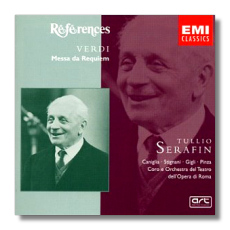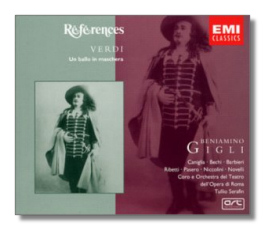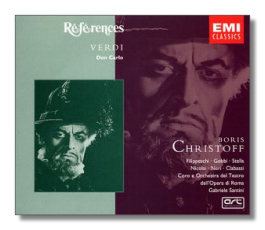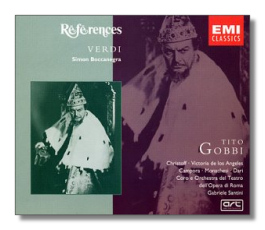
The Internet's Premier Classical Music Source
Related Links
- Verdi Reviews
- Latest Reviews
- More Reviews
-
By Composer
-
Collections
DVD & Blu-ray
Books
Concert Reviews
Articles/Interviews
Software
Audio
Search Amazon
Recommended Links
Site News
 CD Review
CD Review
Giuseppe Verdi

EMI Rèférences
Requiem Mass
Maria Caniglia, soprano
Ebe Stignani, mezzo-soprano
Beniamino Gigli, tenor
Ezio Pinza, bass
Orchestra & Chorus of the Rome Opera House/Tullio Serafin
EMI Classics 67486 ADD monaural 72:19


Un ballo in maschera
- Beniamino Gigli (Riccardo)
- Maria Caniglia (Amelia)
- Gino Bechi (Renato)
- Fedora Barbieri (Ulrica)
- Elda Ribetti (Oscar)
Orchestra & Chorus of the Rome Opera House/Tullio Serafin
EMI Classics 67476 ADD monaural 2CDs: 48:08, 72:54


Don Carlos
- Boris Christoff (Filippo II)
- Mario Filippeschi (Carlo)
- Tito Gobbi (Rodrigo)
- Antonietta Stella (Elisabetta)
- Elena Nicolai (Eboli)
- Giulio Neri (Inquisitor)
Orchestra & Chorus of the Rome Opera House/Gabriele Santini
EMI Classics 67479 ADD monaural 3CDs 62:19, 35:11, 72:23


Simon Boccanegra
- Tito Gobbi (Simon Boccanegra)
- Boris Christoff (Fiesco)
- Victoria de los Angeles (Amelia)
- Giuseppe Campora (Gabriele)
Orchestra & Chorus of the Rome Opera House/Gabriele Santini
EMI Classics 67483 ADD monaural 2CDs: 61:34, 77:35
These four "Rèférences" reissues apparently were intended to coincide with the hundredth anniversary of Verdi's death. All are associated with the Rome Opera House and feature stellar male singers – Beniamino Gigli, Tito Gobbi, or Boris Christoff – whose names still sell CDs. This is at least the second time that EMI Classics has reissued these recordings on CD. These remasterings don't modernize sound that is compromised by time (to varying degrees), but there are subtle improvements to be had here: for example, the reduction of previously problematic tape hiss in Simon Boccanegra.
The earliest recording here is that of Verdi's Requiem Mass. Recorded in 1939, it was not released outside of Italy until the end of World War Two, but it has been a well-loved performance ever since. It is an unashamedly operatic one too. There's nothing wrong with that (the soprano and mezzo who sang in the première were Verdi's original Aïda and Amneris). Still, perhaps Gigli's bawling "Kyrie eleison" and crooning "Hostias" are not precisely what Verdi had in mind back in 1874. He dominates his colleagues (including the chorus) almost every time that he opens his mouth. Still, one can't deny that this is beautiful singing – something we don't often hear the likes of more than sixty years later – so if Gigli sings like an overly enthusiastic teenager, it is hard to remain angered by that. Pinza sings remarkably, and with genuine authority in the "Mors stupebit" and "Confutatis." My only regret is that he didn't record the Requiem again ten years later when his voice had darkened. Caniglia is very good here (better than she is in Ballo – see below) and Stignani, although she is not terribly imaginative, is solid. She and Caniglia blend together better than most soprano-mezzo pairs. Serafin conducts some of this work too quickly for my tastes; the Sanctus should not sound like the finale of Rossini's William Tell Overture, for example. Most of the time he brings a Toscanini-like intensity to Verdi's "sacred opera", but not the corresponding discipline. The chorus (its director is not credited) shows more discipline than anyone else on this recording. Hearing this spectacular work in less than modern sound can be akin to eating a candy bar with the wrapper still on, but it is surprising how much the ear and the brain can "fill in" when the music is familiar and the performance is exciting… as it is here.
Gigli was a natural for the part of Riccardo, the ebullient but doomed Governor of colonial Boston (or, if you prefer, the King of Sweden) in Verdi's Un ballo in maschera. From the moment he appears "on stage," he cuts a likeable if somewhat reckless figure. Although his voice isn't as fresh on this 1943 recording as it was 10 or 15 years earlier, his honey-toned singing still spells excitement and romance. As in the Requiem, he isn't the subtlest singer (his laughter in "È scherzo od è follia" quickly grows tiresome), but no one can accuse him of vocal or interpretive stinginess on this recording. Caniglia used her voice hard during the 1930s, and the unfortunate outcome can be heard here; her production is squally, and high notes frequently screech out of control. Still, she was one of the era's more important sopranos, and she commanded respect if not love in this repertoire. Bechi is one of the finest Renatos on record (I find him superior to the generally admired Tito Gobbi), and Fedora Barbieri's Ulrica, recorded at the beginning of the mezzo's career, is excellent. As Oscar, Elda Ribetti, all coloratura and little imagination, is rather annoying. Serafin's conducting is brisk and just somewhat better than routine. I suspect that the four- to five-minute 78-rpm side lengths of the era had a negative impact here. The sound is not the best that 1943 had to offer, but remember World War Two was almost literally raging around these musicians as they made this recording. The digital remastering does what it can, but the theatricality of this recording is what really saves the day.
The Don Carlos was recorded in 1954, and has long been a staple of the catalog, mostly because of the singing of Boris Christoff. The Bulgarian bass's portrayal of the conflicted King Philip II of Spain has never been surpassed, and he is the main reason why this set continues to be available nearly fifty years later. His memorable voice, so full of expression – and, when needed – power, capture the sufferings of a king whose family and political situations are on equally shaky ground as his middle age wanes. Nearly as good is Tito Gobbi's Rodrigo; his "O Carlo ascolta" in the final act is sung with a tenderness that leaves no doubt as to his feelings for the Infante. His pitch is not infallible, however, and when he pushes for more volume he tends to go flat. Filippeschi sings heroically, but with no great interpretive distinction, and Stella is in the same league; her voice is not the prettiest, but she gets the job done. How wonderful it would have been if Maria Callas had taken this role instead! (She sang it at La Scala at about the same time.) Nicolai's Eboli is fine, but she would have been more attractive if her notes spread less. Neri is an effective enough Inquisitor, and the other small roles are done dependably. The biggest challenge here is the cut score, and Santini's conducting, which knows three speeds: slow, slower, and slowest. It emphasizes the opera's majesty but not its drama. Good mono sound is offered here, with the voices almost too far forward.
Christoff is no less powerful in the psychologically complex role of Fiesco in the 1957 Simon Boccanegra, and Gobbi, not obligated to play a romantic hero as he was in Don Carlos, ascends to greater heights in the title role. The closing moments of this opera team these stalwart lower voices with those of de los Angeles (born to sing this role on record, if not on stage) and Campora, a dependable tenor who distinguishes himself in a thankless role. (His aria, if it can be called one, is over before he blinks.) For listeners raised on Trovatore and Traviata, Simon Boccanegra can be slow going. It is known chiefly for Fiesco's "Il lacerato spirito" and Amelia's "Come in quest'ora bruna," and perhaps also for the Council Chamber scene, which is gripping when sung by a great singing actor such as Gobbi (or, in the generation before his, Lawrence Tibbett). Again, Serafin's slow tempos emphasize Simon Boccanegra's dark colors, not its incipient excitement; I find them less distracting than I did in Don Carlos. I am not sure why this recording was not done in stereo; the technology certainly was in place in 1957, and only two years would elapse before Santini and de los Angeles recorded Madama Butterfly in the same location. At any rate, the monaural recording has enough impact, and this new digital transfer shows it off. Again, the voices are given top priority, and the orchestra scores points when it can.
All four recordings come with a booklet that includes texts and translations, as well as background to the recordings. Congratulations to EMI Classics for continuing to take care of their legacy, and for giving it its due respect.
Copyright © 2001, Raymond Tuttle


















